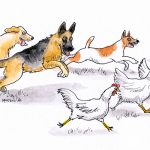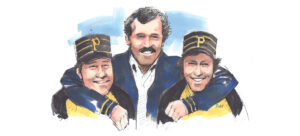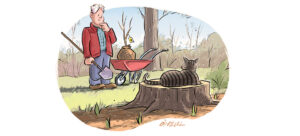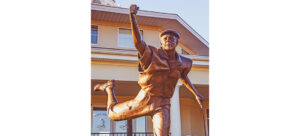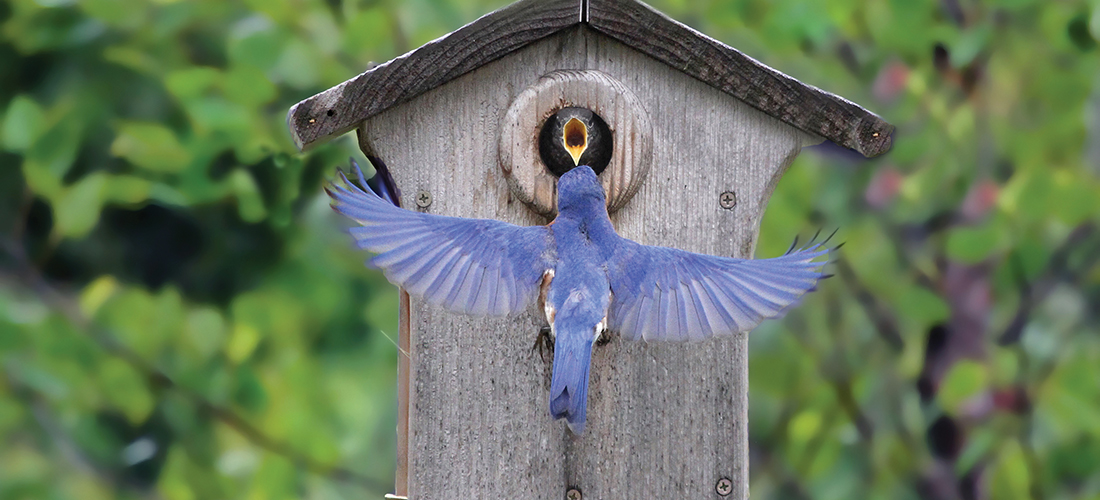
A Hitchhiker’s Guide
Finding the universe in bluebirds
By Tom Bryant
“I went to the woods because I wished to live deliberately, to front only the essential facts of life and to see if I could not learn what it had to teach, and not, when I came to die, to discover that I had not lived.” — Henry David Thoreau
I haven’t met that many people who marched to Thoreau’s drummer. My father for sure, my grandfather without a doubt, and there was a gentleman I had the opportunity to meet for only about an hour, but that fellow was a walking example of what Thoreau had in mind when he penciled his famous Walden.
I’ve talked about it some and have written about the unusual experience I had that hot August afternoon when I met “Hank,” as he said he liked his friends to call him.
It was the week before dove season, and I was as busy as the proverbial one-armed paperhanger trying to get everything done on my newly leased little farm to be ready for opening day. I had invited several friends to help usher in the season, and was running back and forth from our home in Southern Pines to the field located close to Drowning Creek.
It was just before lunch, and the sun was really bearing down when I noticed a hitchhiker right outside of Aberdeen on U.S. 1. He had a sign made from a piece of cardboard with the message:
HEADING SOUTH . . . NO HURRY
The little cardboard sign got my attention, because back in my early days, I used to move around the country hitchhiking, using the same method, a hand-lettered sign with my destination scribbled across the cardboard. It worked.
Those were different days when I used my thumb to get back and forth to college. They were simpler, more peaceful times, and a lot of youngsters got about by hitching rides. But this guy had no destination listed, just south, and he said he was in no hurry. Unheard of, I thought, as I rode by the gentleman standing on the side of the road. Everybody is supposed to be in a hurry.
On my second trip to the farm, the hitchhiker was still in about the same location, walking toward Pinebluff. What the heck, I thought. It’s too hot for the old guy. I decided to pick him up and pulled over to the side.
He hurried up to the Bronco, looked in and said, “Thanks for stopping, mister. It’s getting dang hot out here.” The gentleman looked to be anywhere between 60 and 70. He was dressed neatly in well worn but clean clothes. He had a small backpack, and I could tell he wasn’t your run-of-the-mill loafer. He climbed in the Bronco, and I drove on south.
“Hot day to be out here, fellow,” I said. “Where you headed?”
“You know, I haven’t made my mind up yet. I might visit my sister in Florida or travel to Texas. Texas is supposed to be pretty this time of year.”
And so I met Hank. In our short conversation, I learned that, at one time, he had his own very successful business as a financial consultant and evidently had retired with a bucket full of money. Just when he and his wife were getting ready to enjoy the good life, she came down with a debilitating illness and passed away.
“I started drinking too much,” he said. “Things were on the downhill slide. Nothing meant much to me anymore until one morning I looked out the kitchen window and saw the most beautiful sunrise, and my life turned around. I sold the house, gave everything to the kids, and decided to see the world from the ground up, as it were. I realized I’d never be able to spend all the money I had acquired, and it’s amazing how simply a person can live.
“You know what I did this spring? Watched a pair of bluebirds build a nest and have babies. That’s all I did. I had a part-time job on a horse farm in Virginia, and when I wasn’t cleaning stables, I watched those two little birds. It was wonderful.”
I dropped Hank off a short way from Rockingham, where he said he was going to spend a couple days in a motel, resting and escaping the current heat wave.
I never saw this truly contented man again.
My grandfather, a farmer, spent his life in and made his livelihood from his fields in the low country of South Carolina. He was dedicated to the outdoors, not just for the esoteric aspect but because that’s where he made his living and supported a family of eight children. I spent many days as a youngster following him through freshly planted fields and riding in his pickup as he checked on how his crops were growing. Those drives usually occurred on Sunday, when my grandmother would be at the little Baptist country church located close to the farm. She played the piano for the choir and was a huge supporter of the small house of worship. Me? I stuck close to Granddaddy’s side.
One Sunday as we were checking crops down close to the creek, I asked him, “Granddad, you don’t go to church with Grandma. Why is that?”
He pulled the pickup under a giant live oak and said, “Come on, son, I want to show you something.”
We walked down toward the creek, and he said, “Now, what do you see?”
I was kind of mystified as to where the conversation was going. “Well, I see the creek and the swamp and those giant cypress trees. That’s about it.”
“What do you hear? Listen good. Close your eyes and listen.”
“Crows. Sounds like they’re down the creek around the bend. And the creek water current is burbling, sort of like a whispering noise. And, oh yeah, a blue jay calling from across the creek, and a woodpecker is pecking somewhere close.”
I opened my eyes and we stood there silently on the bank of the little fast moving stream. “Son, this is my church. I figure the outdoors, this creek, our fields, anywhere I am in the woods is about as close to the good Lord as I’m gonna get, until He calls me and wants to talk on a more personal basis. No time soon, I hope,” he said, laughing.
The other person in my litany of outdoor champions is my dad, the finest man I’ve known. An orphan whose parents died in the 1918 flu epidemic, he was placed in the local boys’ home, and that’s where he lived until graduating from high school. A fantastic high school athlete, he won numerous scholarships to several colleges but decided on Clemson. He met Mother, and as they say, the rest is history.
My dad always lived close to the natural world. Growing up in the boys’ home, he was responsible for the garden that helped feed the residents, and that everyday closeness to nature as a boy never went away. He had a morning habit that was a real mystery to me until one morning I asked Mother what he was he doing.
My siblings and I would be around the breakfast table, chowing down, getting ready for school, and Dad would make a cup of coffee and go outside. He would stand there under an ancient longleaf pine, drinking coffee, looking toward the woods that led down to the lake. He followed that same routine every day.
“Tommy,” my mom said, “I believe that’s how your dad communicates with the Almighty.” Dad was outside standing in about the same spot drinking his coffee and looking toward the woodland.
“I think it’s as simple as he’s planning his day and praying for good things for his family.”
Thoreau, if he had had the opportunity to meet my dad, my granddad and Hank, would have been proud to include them in his small circle of friends. PS
Tom Bryant, a Southern Pines resident, is a lifelong outdoorsman and PineStraw’s Sporting Life columnist.

